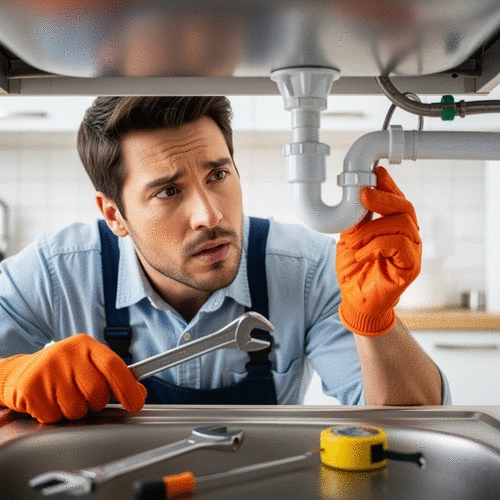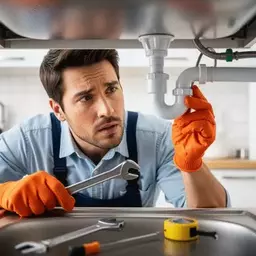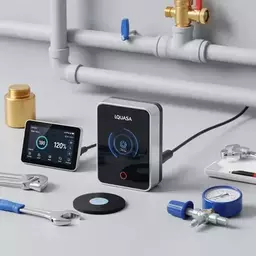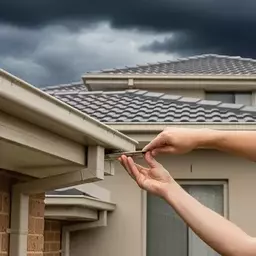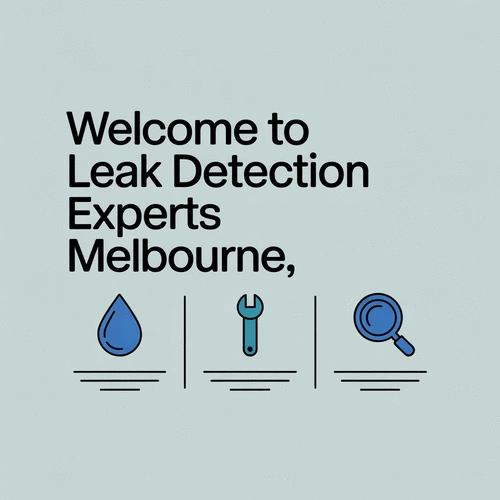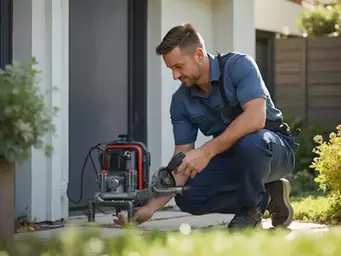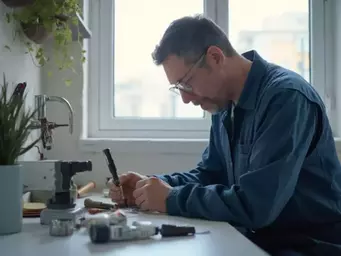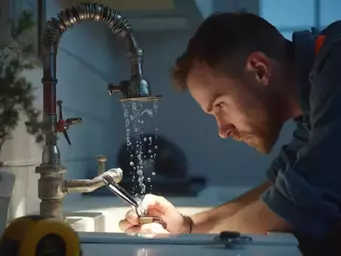Have you ever ignored a small plumbing issue, thinking it would resolve itself? The truth is, neglecting minor symptoms can lead to major disasters. Here's what you need to know to stay proactive and avoid costly repairs in your home.
What You Will Learn
- Overlooking minor leaks can lead to mold growth and extensive water damage.
- Misdiagnosing clogs often results in improper fixes that could worsen the situation.
- Over-tightening connections can create leaks instead of preventing them.
- Chemical drain cleaners might provide a quick fix but can damage your plumbing over time.
- Neglecting plumbing codes can lead to safety hazards and significant legal implications.
Common Plumbing Diagnostic Mistakes and Solutions
Understanding and rectifying common plumbing diagnostic mistakes is crucial for homeowners. The visual below highlights key issues and their effective solutions.
Overlooking Leaky Faucets
Symptoms: Dripping sounds, water pooling, higher water bills.
Solution: Prompt repair, professional assistance if unsure.
Misdiagnosing Clogs
Mistake: Using wrong fixes (e.g., plunger on kitchen sink).
Solution: Identify clog type, avoid harsh chemicals, use plumbing snake.
Over-tightening Connections
Risk: Leaks, cracked fittings.
Solution: Hand-tighten, use torque wrench for critical connections.
Using Chemical Drain Cleaners
Risk: Pipe damage, health hazards.
Solution: Baking soda/vinegar, plunger, professional help.
Neglecting Plumbing Codes
Risk: Fines, safety hazards, legal issues.
Solution: Familiarize with codes, hire licensed plumber.
Understanding Common Plumbing Diagnostic Mistakes
When it comes to plumbing, accurate diagnosis is vital for homeowners. Not only does it prevent further damage to your property, but it also helps avoid increased repair costs and safety hazards. I've seen too many clients neglect small symptoms that escalate into major issues, costing them both time and money. It’s crucial to be attentive and proactive about plumbing problems to keep your home safe and functional!
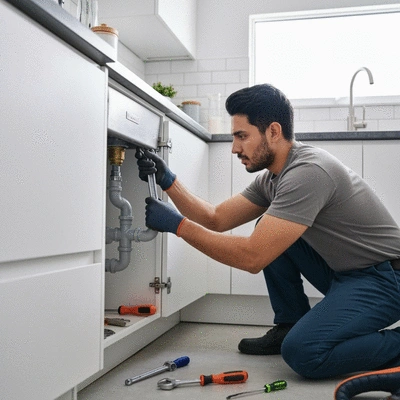
Remember, a minor leak today might turn into a significant flood tomorrow. By understanding how to properly diagnose plumbing issues, you can save yourself from potential disasters. Let's delve into some common mistakes that I’ve encountered over my years in the plumbing industry, particularly focusing on how they can impact your home. For more detailed insights, consider exploring our Melbourne Plumbing Diagnostics Guide.
Identifying the 5 Common Plumbing Diagnostic Mistakes
Overlooking Leaky Faucets: Symptoms and Solutions
Ignoring a leaky faucet might seem harmless, but it can lead to severe consequences like mold growth and extensive water damage. It’s essential to recognize the symptoms of a leak. A dripping faucet not only wastes water but can also indicate more significant plumbing issues lurking beneath the surface.
- Watch for signs of water pooling near the base of the faucet.
- Listen for dripping sounds that persist even when no one is using the faucet.
- Check your water bill for unexpected spikes that could indicate a hidden leak.
Addressing these leaks promptly can save you a lot of hassle in the long run. If you’re unsure about how to fix it, don’t hesitate to reach out to us at Leak Detection Experts Melbourne for assistance!
Misdiagnosing Clogs: The Wrong Fixes
Another common mistake I often see is misdiagnosing clogs. Homeowners sometimes assume that all clogs are the same, leading them to apply the wrong fixes, which can worsen the problem. For instance, using a plunger on a clogged toilet might work, but using it on a kitchen sink could cause more damage.
- Identify the type of clog (drain, toilet, etc.) before attempting a fix.
- Avoid using harsh chemicals, which can damage pipes.
- Consider using a plumbing snake for tougher clogs.
Proper identification of the clog type can save you from unnecessary repairs and confusion. If you find yourself facing persistent clogs, don’t hesitate to call in the professionals!
Over-tightening Connections: Understanding the Risks
Over-tightening plumbing connections can lead to leaks, a mistake that many homeowners make unknowingly. While it’s natural to want to ensure everything is secure, excessive force can cause fittings to crack or warp. Instead, aim for a snug fit without going overboard.
- Use hand-tightening for most fittings.
- Consider using a torque wrench for critical connections.
- Regularly inspect fittings to ensure they remain secure without being over-tightened.
By understanding how to properly tighten connections, you can maintain the integrity of your plumbing system and reduce the risk of leaks.
Using Chemical Drain Cleaners: A Risky Choice
Many homeowners turn to chemical drain cleaners as a quick fix for their plumbing woes. However, this choice can be risky! These cleaners can damage pipes over time and pose health hazards to you and your family. There are safer alternatives for addressing stubborn clogs.
- Try a mixture of baking soda and vinegar for a natural solution.
- Use a plunger or plumbing snake instead of harsh chemicals.
- Consult a professional for severe clogs rather than risking pipe damage.
At Leak Detection Experts Melbourne, we always recommend avoiding chemical drain cleaners to protect your plumbing and home environment. You can learn more about leak prevention tips for homeowners on our website.
Neglecting Plumbing Codes: Why Compliance Matters
Lastly, neglecting local plumbing codes can lead to significant legal and safety implications. Each area has specific regulations designed to ensure safe plumbing practices, and ignoring them can result in costly fines or dangerous situations.
- Familiarize yourself with local plumbing codes and regulations.
- Ensure any DIY work is compliant with these codes.
- Consider hiring a licensed plumber to handle complex installations.
Compliance with plumbing codes is not just about following the law; it's about ensuring the safety and efficiency of your plumbing system!
Pro Tip
Did you know? Regularly inspecting your plumbing system can help catch small issues before they escalate. Make it a habit to check for visible leaks, listen for unusual sounds in your pipes, and monitor your water bill for unexpected spikes. By staying proactive, you can save time, money, and avoid the stress of major plumbing emergencies!
Summarizing Key Plumbing Diagnostic Insights
As we’ve explored, accurate plumbing diagnostics are crucial in maintaining the health of your home’s plumbing system. Common mistakes such as overlooking leaky faucets, misdiagnosing clogs, and neglecting plumbing codes can lead to a cascade of problems.
Each of these mistakes can result in significant damage and costly repairs down the line. By being aware of these pitfalls, homeowners can better safeguard their properties against unnecessary stress and expense.
- Overlooking minor leaks can lead to mold and structural damage.
- Misdiagnosing clogs often results in improper fixes that only mask the problem.
- Over-tightening connections can create leaks instead of preventing them.
- Chemical drain cleaners might provide a quick fix but can damage your plumbing.
- Neglecting plumbing codes can result in safety hazards and legal issues.
Recognizing these key insights empowers homeowners, like you, to take proactive measures. At Leak Detection Experts Melbourne, we emphasize the importance of understanding these diagnostics to protect your home effectively.
Taking Action: Proactive Steps for Your Plumbing Health
Now that you’re equipped with insights into common plumbing mistakes, it’s time to take action! Start by downloading our handy checklist that allows you to assess your plumbing system and identify any potential issues you might be overlooking.

Additionally, consider scheduling a professional inspection with our team at Leak Detection Experts Melbourne. Regular check-ups can prevent minor issues from escalating into major disasters. Implementing preventative measures, such as installing water-efficient fixtures, can also save you money in the long run.
- Download our printable plumbing checklist.
- Schedule an inspection to identify hidden leaks.
- Implement preventive measures to maintain plumbing health.
Taking these steps today will contribute to the longevity of your plumbing system and give you peace of mind. After all, a proactive approach is always better than dealing with emergencies!
Common Plumbing Issues and Effective Solutions
In the plumbing world, certain issues tend to arise more frequently than others. Let’s highlight some of these common plumbing problems and the solutions that can effectively address them.
- Clogged Drains: Regularly clean your drains and consider using a drain strainer to prevent debris buildup.
- Running Toilets: This could be due to a faulty flapper; replacing it often resolves the issue.
- Leaky Pipes: If you spot leaks, don’t hesitate! Call us for prompt detecting water leaks in homes and repair services.
- Water Heater Problems: Regular maintenance can extend the life of your water heater. Schedule an inspection to ensure efficiency.
By addressing these common issues promptly and effectively, homeowners can avoid larger problems that could lead to costly repairs. Remember, our team at Leak Detection Experts Melbourne is here to help with any plumbing challenges you may face.
Frequently Asked Questions About Plumbing Diagnostics
Many homeowners often have questions regarding plumbing diagnostics. I’d like to address some of the most common inquiries we receive at Leak Detection Experts Melbourne.
FAQs
Q1: What are the primary signs of a hidden water leak in my home?
A1: Key signs include unexplained spikes in your water bill, damp spots on walls or ceilings, peeling paint or wallpaper, a persistent musty odor, and the sound of running water when no fixtures are in use.
Q2: Why are chemical drain cleaners considered risky for plumbing systems?
A2: Chemical drain cleaners can be corrosive and may damage pipes over time, especially older ones. They can also pose health hazards due to their harsh chemicals. Safer alternatives include baking soda and vinegar, plungers, or professional snaking.
Q3: How can I avoid misdiagnosing a plumbing clog?
A3: Before attempting a fix, try to identify the type and location of the clog. For example, a toilet plunger is not effective for a kitchen sink clog. Avoid using general solutions and consider the specific nature of the blockage. If unsure, professional help is best.
Q4: What are the consequences of neglecting local plumbing codes during DIY repairs?
A4: Neglecting plumbing codes can lead to significant issues, including fines from local authorities, safety hazards (like improper ventilation or cross-contamination), and potential legal complications, especially if the work causes damage or injury. It can also affect home insurance claims and resale value.
Q5: How can regular maintenance help prevent major plumbing disasters?
A5: Regular maintenance, such as checking for leaks, listening for unusual sounds, and monitoring water bills, helps identify small issues before they escalate. Proactive measures like addressing minor drips or slow drains promptly can prevent extensive damage and costly emergency repairs.
By familiarizing yourself with these FAQs, you can better navigate plumbing diagnostics and ensure the health of your home’s plumbing system. Knowledge is power, and I’m here to help you every step of the way!
Recap of Key Points
Here is a quick recap of the important points discussed in the article:
- Overlooking minor leaks can lead to mold and structural damage.
- Misdiagnosing clogs often results in improper fixes that only mask the problem.
- Over-tightening connections can create leaks instead of preventing them.
- Chemical drain cleaners might provide a quick fix but can damage your plumbing.
- Neglecting plumbing codes can result in safety hazards and legal issues.

